

2012-13 Term. Loving v. Virginia. Chaplinsky v. New Hampshire. Chaplinsky v.
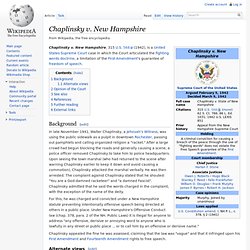
New Hampshire, 315 U.S. 568 (1942), is a United States Supreme Court case in which the Court articulated the fighting words doctrine, a limitation of the First Amendment's guarantee of freedom of speech. Background[edit] In late November 1941, Walter Chaplinsky, a Jehovah's Witness, was using the public sidewalk as a pulpit in downtown Rochester, passing out pamphlets and calling organized religion a "racket. " After a large crowd had begun blocking the roads and generally causing a scene, a police officer removed Chaplinsky to take him to police headquarters.
Upon seeing the town marshal (who had returned to the scene after warning Chaplinsky earlier to keep it down and avoid causing a commotion), Chaplinsky attacked the marshal verbally. For this, he was charged and convicted under a New Hampshire statute preventing intentionally offensive speech being directed at others in a public place. Alternate views[edit] Brown v. Mississippi. Facts of the case[edit] Raymond Stuart, a white planter, was murdered on March 30, 1934.
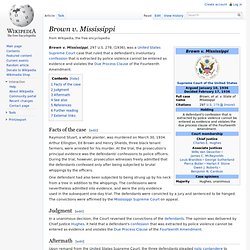
Arthur Ellington, Ed Brown and Henry Shields, three black tenant farmers, were arrested for his murder. At the trial, the prosecution's principal evidence was the defendants' confessions to police officers. During the trial, however, prosecution witnesses freely admitted that the defendants confessed only after being subjected to brutal whippings by the officers. One defendant had also been subjected to being strung up by his neck from a tree in addition to the whippings.
Judgment[edit] Aftermath[edit] FCC v. Pacifica Foundation. Federal Communications Commission v.
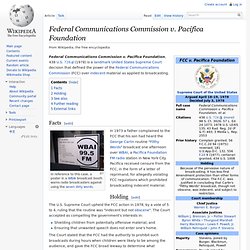
Pacifica Foundation, 438 U.S. 726 (1978) is a landmark United States Supreme Court decision that defined the power of the Federal Communications Commission (FCC) over indecent material as applied to broadcasting. Facts[edit] In reference to this case, a poster in a WBAI broadcast booth warns radio broadcasters against using the seven dirty words. In 1973 a father complained to the FCC that his son had heard the George Carlin routine "Filthy Words" broadcast one afternoon over WBAI, a Pacifica Foundation FM radio station in New York City. Pacifica received censure from the FCC, in the form of a letter of reprimand, for allegedly violating FCC regulations which prohibited broadcasting indecent material.
Holding[edit] United States v. Nixon. Frontiero v. Richardson. Frontiero v.
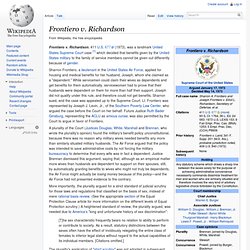
Richardson, 411 U.S. 677 (1973), was a landmark United States Supreme Court case [1] which decided that benefits given by the United States military to the family of service members cannot be given out differently because of gender. Sharron Frontiero, a lieutenant in the United States Air Force, applied for housing and medical benefits for her husband, Joseph, whom she claimed as a "dependent. " While servicemen could claim their wives as dependents and get benefits for them automatically, servicewomen had to prove that their husbands were dependent on them for more than half their support. Joseph did not qualify under this rule, and therefore could not get benefits. Miranda v. Arizona. Miranda v.
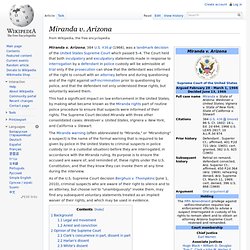
Arizona, 384 U.S. 436 (1966), was a landmark decision of the United States Supreme Court which passed 5–4. The Court held that both inculpatory and exculpatory statements made in response to interrogation by a defendant in police custody will be admissible at trial only if the prosecution can show that the defendant was informed of the right to consult with an attorney before and during questioning and of the right against self-incrimination prior to questioning by police, and that the defendant not only understood these rights, but voluntarily waived them. This had a significant impact on law enforcement in the United States, by making what became known as the Miranda rights part of routine police procedure to ensure that suspects were informed of their rights. Coker v. Georgia (1977) Cases citing this case: Supreme CourtCases citing this case: Circuit Courts.
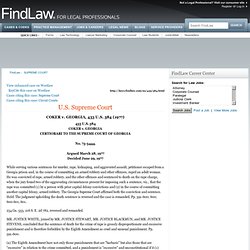
Dred Scott v. Sandford. Dred Scott v.
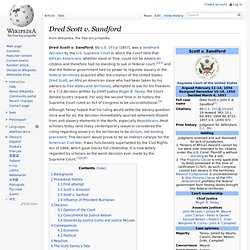
Sandford, 60 U.S. 393 (1857), was a landmark decision by the U.S. Supreme Court in which the Court held that African Americans, whether slave or free, could not be American citizens and therefore had no standing to sue in federal court,[2][3] and that the federal government had no power to regulate slavery in the federal territories acquired after the creation of the United States. Dred Scott, an African American slave who had been taken by his owners to free states and territories, attempted to sue for his freedom. In a 7–2 decision written by Chief Justice Roger B. Taney, the Court denied Scott's request.
Although Taney hoped that his ruling would settle the slavery question once and for all, the decision immediately spurred vehement dissent from anti-slavery elements in the North, especially Republicans. Background[edit] Portrait of Dred Scott In 1837, the Army ordered Emerson to Jefferson Barracks Military Post, south of St. Procedural history[edit] First attempt[edit] Death Penalty Information Center. Introduction The United States Supreme Court agreed on January 4, 2008 to review the case of a man in Louisiana who was sentenced to death for the rape of a child who did not die.
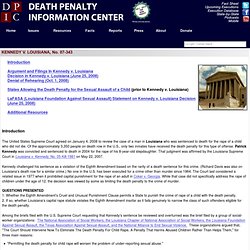
NEW YORK v. Benjamin QUARLES. Supreme Court declines to take up Abu Ghraib detainee lawsuit. A group of former detainees at the infamous Abu Ghraib prison in Iraq will not be able to sue military contractors who they say participated in torture and other illegal acts of abuse at the US-run detention facility in 2003 and 2004.
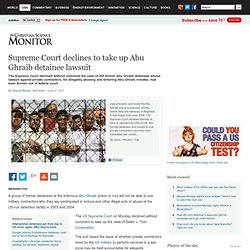
Skip to next paragraph Subscribe Today to the Monitor Click Here for your FREE 30 DAYS ofThe Christian Science MonitorWeekly Digital Edition. Supreme Court rules against N.C. in juvenile Miranda rights. Why It's Constitutional to Execute an Innocent Man.